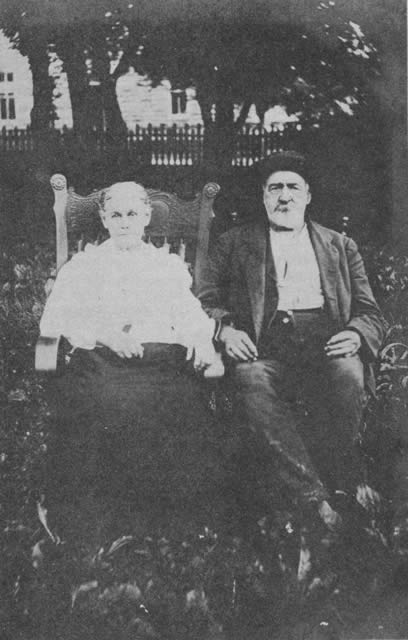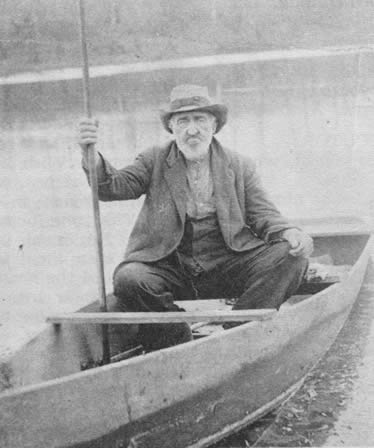Volume 1, Number 6 - Winter 1962
WITNESS: Uncle John
By Joseph H. Ingenthron
(More stories about Uncle John can be found in Mr. Ingenthron's book, A FICTITIOUS LOVE AFFAIR AND OTHER SHORT STORIES, in 1945, Permission to use this condensed version of the story of the famous trial was granted by the present owner of the copyright, Mr. William J. Ingenthron. Photographs courtesy Miss Sibyl Parrish.)
Every small town has had at some time in its history a person who stands out in the memory of its inhabitants long after he is gone, a person who is remembered because of his individuality. Such a man was "Uncle" John Hilsabeck, whose vocation was fishing and whose avocation was assistant manager of Forsyth's leading hotel. His wife, "Aunt" Becky, was the manager.
Uncle John perhaps is best remembered for the good witness he did not make at a criminal prosecution of a number of the town's citizens who stood charged with fishing on the first day of the week commonly known as Sunday."
At the time of the trial, Missouri Statutes prohibited practically all kinds of activity except those of a religious nature on Sunday. It provided, of course, that if you kept some other day holy, the law did not apply to you.
Fishing on Sunday was a serious offense and, on the Sunday in question, thirteen families from Forsyth had not only fished, they had openly and notoriously had a fishfry on the gravel bar just below town. The date on the calendar proved that it was "the first day of the week commonly called Sunday" and it was a known fact that not one of the party was a Seventh Day Adventist.
At that time, the Prosecuting Attorney did not receive any salary, but was paid $5 for each conviction. He filed on the thirteen men in the families. In addition to his expecting to receive $65 for the convictions, it was claimed by some that he was actuated by having failed to carry that precinct in the last election.
The thirteen were all arrested and duly arraigned for trial before the Justice of the Peace of that township.
When the date of the trial arrived, all the witnesses knowing anything about the fishfry, with the exception of Uncle John, were not to be found. The defendants, of course, did not have to testify against themselves and their wives were exempt by the same rule. Uncle John was the only witness. He had dropped by the Sunday gathering, had eaten of whatever was served and had partaken of the hospitality in general.
The defendants worried greatly about Uncle John's refusal to let any of them buy him a drink from the time he was supoenaed; neither would he discuss with any one what his testimony would be.

Mr. and Mrs. John Hilsabeck, owners of the Hilsabeck Hotel, Forsyth, Missouri.
None of the defendants wanted to jeopardize his own reputation for truth and veracity by taking the witness stand and denying that he had been fishing on Sunday. They realized that the whole community either knew, or at least believed, that they were fishing that Sunday. The Prosecuting Attorney also knew this, but he hoped
[8]
that some of them would take the witness stand. The result was that he decided to go to trial with Uncle John as his only witness.
Uncle John was solemnly sworn to tell the truth, the whole truth, and nothing but the truth. To this day, those still living who were there insist that Uncle John obeyed the last phrase of his oath with religious conviction.
After the usual questions as to his name, residence and occupation were answered, Uncle John was asked if he knew the defendants.
Answer: "I say, I say, who are the defendants?"
They were named for him.
A. "I say, I say, I know
Q. ";Did you see them, or any of them, on Sunday, the -- day of --, 19-?"
A. "I say, I say, I believe I saw 'em all."
Q. "Where did you see them?" A. "I say, I say, I saw 'em in different places."
After forty-five minutes, the Prosecuting Attorney succeeded in getting the witness to state that he had seen all thirteen of them down on the river bank. He then proceeded:
Q. "Now state to the court what they were doing down there".
A. "I say, I say, I don't know what-all they done".
Q. "Well, were they fishing?"
BY THE ATTORNEY FOR THE DEFENDANTS:
"We object; the question is leading and suggestive."
BY THE COURT:
"Objection sustained. Mr. Prosecutor, you must not lead the witness. Uncle John, you tell in your own words what you saw, if anything."
BY THE PROSECUTOR:
Q. "You stated you knew Jess, here?"
A. "I say, I say, yes, I know Jess."
Q. "Well, tell what you saw him do."
A. "I say, I say, I saw him helping his wife take care of the baby."
Q. "Well, was that all he did?"
A. "I say, I say, I guess that wasn't all he done."
Q. "Go ahead and tell what they were doing. You know good and well what they were doing."
BY THE ATTORNEY FOR THE DEFENDANTS:
"We object to the Prosecuting Attorney reprimanding his own witness."
BY THE COURT:
"Objection sustained. Mr. Prosecuting Attorney, you let the witness tell what he saw."
BY THE PROSECUTOR:
Q. "All right, go ahead, what did you see him do?"
A. "I say, I say, I saw him eat a sandwich."
The Prosecuting Attorney, after another thirty minutes, had a complete list of everything Jess had eaten for dinner which included sandwiches, pickles, onions and several kinds of pie, but apparently from the record Jess did not eat any fish, if there was any. (The record did not disclose whether there was or not.)
Q. "Did you see him do anything besides take care of the baby and eat?"
A. "I say, I say, he washed his face and hands before dinner."
Q. "Now, did you see him anywhere else besides on the river bank, or as you call it, the gravel bar?"
A. "I say, I say, I saw him up-town that morning."
Q. "I mean when he was down there with the crowd. Was he on the bank or bar all the time ?"
A. "I say, I say, I saw him out on the river.
Q. "All right, Uncle John, tell us what he was doing on the river.
A. "I say, I say, he was paddlin' around."
Q. "What was his purpose or reason for being out on the river?"
BY THE ATTORNEY FOR THE DEFENDANTS:
"We object, as calling for a conclusion of the witness."
BY THE COURT:
"Objection sustained. The witness can tell what he actually saw, not any conclusion he might have arrived at as to their reason or purpose for being out there".
BY THE PROSECUTOR:
Q. "Go ahead. What else did you see him do besides paddle around?"
A. "I say, I say, I saw him reach in his pocket."
Q. "Well, tell us what he got out of his pocket."
A. "I say, I say, he got out his pipe."
Q. "Well, I suppose he smoked his pipe. Did he? Now, did you see him do anything else?
Uncle John had seen him do other things, with an "I say, I say" before each answer, he had seen him reach in his pocket again. This time for a match. For himself? No, for his partner, Bill. He had seen them land on the other side of the river, tie up the boat, disappear into the woods, return, get in the boat, paddle around again, etc., etc. At last, the Prosecuting Attorney, practically exhausted, asked:
"Q. "Now tell us what else you saw."
A. "I say, I say, I saw him get out his knife."
Q. "Now tell us, Uncle John, what he did with his knife."
A. "I say, I say, he scraped his fingernails."
Q. "Uncle John, do you realize that you have been on the witness stand five hours?
A. "I say, I say, before noon and after noon is most nigh a day's work."
Q. "Now, will you please tell us if Jess did anything out of the ordinary down there?"
A. "I say, I say, I saw him take a long string out of his pocket."
Q. "All right now, tell us what he did with that string."
A. "I say, I say, he helped tie up a boy's sore toe."
The Prosecutor leaped to his feet with the exclamation: "I say, I say, the witness is excused!"
BY THE COURT:
"Case dismissed for lack of evidence and I say, I say, the defendants are all discharged."
(For more about Uncle John, turn page.)[9]
Many years ago a farmer named Flowers who lived in Taney County wrote some verses about Uncle John. By piecing together parts remembered by different people, it must have read about like this:
 UNCLE JOHN
UNCLE JOHN
When Uncle John Hilsabeck said, "I say,
The fish bite fine in the crik today,"
The Judge knew well what his duty was,
In spite of the court, in spite of the laws.
"I say, I say, I was down at dawn,
To a quiet hole on the banks of Swan,
An' the purtiest fish you ever see,
Is waitin' thar, Jedge, fer you an' me."
That settled the case-no court today,
As Uncle John knew in his sly old way.
So they took some tonic to ward off chills,
Cure snake bite and other ills.
Like two small boys, young and gay,
Away they went on that summer day,
And as beneath the cliffs they'd wind their way,
You could hear the echoes, "I say, I say".
Oh the fun they had, you'll never know
Unless you were there in that long ago;
Unless you were there with Jedge and Jawn
In those good old days on the banks of Swan.
[10]
This volume: Next Article | Table of Contents | Other Issues
Other Volumes | Keyword Search | White River Valley Quarterly Home | Local History Home
Copyright © White River Valley Historical Quarterly

